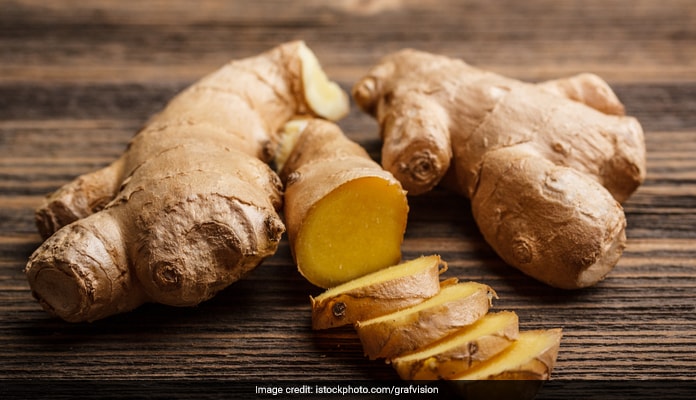Ginger is a root spice that is abundantly used in Asian cuisine. The warm, spicy and pungent flavour of ginger lends flavour to a number of Indian curries and dishes. Indians are also obsessed with the adrak wali chai, which is basically a milky sweet and strong concoction, made by adding generous amounts of grated ginger in it. Ginger is present in almost all Indian kitchens and households and it holds a special place in our lives as well. Not only is it a preferred flavour enhancer, but it also comes with a number of health benefits, including boosting immunity and fighting inflammation in the body. Although ginger is a spice that is warm, it is used in small quantities all year round in India.
Ginger Nutrition
Ginger is very low in calories and contains no cholesterol. The spice is rich in potassium, which boosts heart health and is also rich in vitamin C. The powerful benefits of ginger are credited to the presence of the bioactive compound gingerol in it, which, according to Ayurveda, has antipyretic, analgesic and anti-bacterial properties. The spice is also known for boosting digestion and soothing frequent tummy troubles. It is also known for helping to reduce nausea as well as for improving appetite, especially in people who suffer from certain eating disorders. Ginger juice is also considered healthy for digestion as well as hair and skin. Ginger can be difficult to store, as it tends to either dry out or become moldy.
Also Read: Ginger Oil: Fighting Inflammation And Other Healing Health Benefits Of The Oil

Kitchen Hacks: Ginger may get dry or may develop molds if not stored properly
How To Store Ginger For Longer Shelf Life
Here are some easy ways of preserving the nutrition of ginger and preserving it for a longer shelf life:
1. Peel the ginger with a peeler or a sharp knife. After the peel has been completely removed, using a sharp knife cut the rhizome up into smaller squares. Place these squares into a zip lock pouch and place this pouch in the freezer, for later use. This will keep the ginger fresh for months.
2. If you have to use ginger on a daily basis to add flavour to your curries, then you can mince or grind the fresh ginger into a paste and place the minced ginger in a glass jar. Place this jar in the fridge. Alternatively, you can divide the minced ginger into small portions, freeze them and then add them to a jar to be refrigerated.
Also Read: Benefits Of Ginger Water: Why You Should Have a Glass of Ginger Water Every Day
 Kitchen Hacks: Peel, cut and freeze ginger to increase its shelf-life
Kitchen Hacks: Peel, cut and freeze ginger to increase its shelf-life3. If you don't want to freeze and de-freeze your ginger for daily use, then you can simply wrap the unpeeled rhizome in a paper towel and then place it in a paper bag. Seal the paper bag, before placing it in the vegetable basket of your refrigerator. This keeps the spice fresh for several weeks.
Some people even submerge peeled ginger into alcoholic or acidic liquids like vodka, rice wine, vinegar and lime juice to preserve it. However, this method interferes with and changes the natural flavour and taste of ginger and hence will probably not be worth it. If your ginger rhizome becomes dry, dull-looking and is slightly mushy, then it has probably gone bad and it's best to toss these rhizomes out.
Disclaimer: This content including advice provides generic information only. It is in no way a substitute for qualified medical opinion. Always consult a specialist or your own doctor for more information. NDTV does not claim responsibility for this information.







